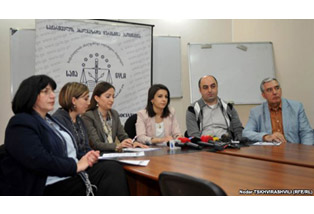Eka Kevanishvili, Radio “Freedom”
Nongovernmental and international organizations petitioned to The Hague International Criminal Court’s Prosecutor, requesting an investigation into cases of possible war crimes committed during the war in August of 2008, and subsequently holding perpetrators accountable under the law.
The NGO sector declared that although relevant institutions in Georgia and Russia claim that investigations are ongoing, neither country has made any investigation results public so far. In addition, two reports by the Norwegian Helsinki Committee highlight significant shortcomings in the investigations. Influential international organization Human Rights Watch, in its 2012 report, also calls upon the government of Georgia to investigate the crimes committed by its soldiers and punish perpetrators under the law.
The NGO’s petition reads: “Mr. Prosecutor, civil society monitoring of these investigations for the past three years has led us to conclude that investigations and prosecutions by Georgia and Russia are not being carried out in a manner in keeping with the Rome Statute’s provisions on jurisdiction and admissibility nor with the principle of complementarity. The absence of any attempts towards co-operation between Russian and Georgian investigative authorities and the fact that the Georgian authorities are unable to conduct investigative activities in South Ossetia where the most serious crimes were committed, makes Georgia unable, even if it was willing, to effectively investigate some of the most serious crimes committed during the 2008 war. Should the ICC-OTP’s attention to the events of August 2008 waver, we fear that all national investigations, however cursory, will be brought to a standstill.” The petition is signed by Georgian Young Lawyers’ Association (GYLA), Human Rights Center, Article 42 of Constitution, Public Advocacy, International Center of Conflict and Negotiations, Norwegian Helsinki Committee and International Federation of Human Rights (FIDH).
Due to threats of dropping the investigation process, the chairperson of GYLA together with her colleagues appeals to the ICC OTP: “The ICC should request the states to actively investigate the crimes and if it (the Court) sees – we presume it will be convinced in it – that investigation is going on ineffectively, the ICC should take up and investigate those cases itself.”
The head of International Center of Conflict and Negotiation (ICCN) Gogi Khutsishvili stated that the process is ongoing but very slow. The NGO petition is one tool to influence the Court: “The truth of what happened should be established. Who was victimized in this war and why, and how the damage to the population in the conflict zone can be reduced.”
GYLA representative Natia Katsitadze clarified that the ICC started preliminary investigations of the war crimes in 2008. Court representatives twice visited Russia and once Georgia; in December of 2011 they published a report with the findings from the preliminary survey. Several crimes were singled out for investigation by the Court. Natia Katsitadze said “among those crimes are internal displacement, destruction the property and attacks on Russian peacekeepers.”
Simon Papuashvili, researcher with the Norwegian Helsinki Committee, said that the document prepared by the ICC OTP does not state anything about the efficiency of the national investigations: “The OTP states that they have regular interactions with Russian and Georgian authorities. Both governments try to convince the Court that local investigations are effectively conducted and that there is no necessity for the involvement of the International Court.”
However, the last two reports of the Norwegian Helsinki Committee highlight shortcomings in the investigation process, says Papuashvili: “Our survey could not detect anything positive with regard to the ongoing investigation because key witnesses who were victims of the war have not been interviewed thus far. The investigation activities were not carried out at important crime scenes.”
Soso Papuashvili added that the Norwegian Helsinki Committee will soon launch a similar survey in Russia too.
NGOs are concerned and claim that Georgian society was not informed about any of the details from the ongoing investigation. Ucha Nanuashvili, head of the Human Rights Center, spoke about this issue: “It is a fact that in July of 2010 amendments were introduced to General Administrative Code of Georgia. The investigation had been open but now it is closed and those amendments deal with all international tribunals concerning Georgia’s issue. Thus, we wonder whether the government hides anything and is afraid of public reaction if any information is released.”
Interestingly, Russian human rights organization Memorial believes that the ongoing investigation in Russia is not effective either. Memorial representative Alexander Cherkasov told Radio Freedom that the Russian government “did not use the framework of human rights as a tool to protect victims of the armed conflict neither on national nor on international levels; instead they used it as mean for political oppression and propaganda. So, that was the reason for the unsuccessful investigation.”
Hundreds of individual lawsuits were lodged with the European Court of Human Rights (ECHR) in Strasbourg. Georgia’s representative in ECHR, Levan Meskhoradze, clarified that among those applications are lawsuits against Georgia and Russia. A legal process has been launched in several cases but the Court has not ruled on them yet except for about 3 300 lawsuits from ethnic Ossetians lodged against Georgia; more than 1500 of the applications were declined by the Court. The Strasbourg Court has not passed any verdicts on cases against Russia either.




